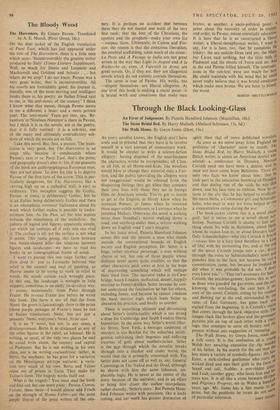The Bloody Wood
The Harvesters. By Cesare Pavese. Translated by A. E. Murch. (Peter Owen, 18s.)
ON the dust jacket of the English translation of Paesi Tuoi, which has just appeared under the title of The Harvesters. there is a little note which says: 'Incontrovertibly the greatest writer produced by Italy' (Times Literary Supplement). Well, so much for Dante and Leopardi and Machiavelli and Goldoni and Ariosto . . but where do we stop? I do not know. Pavese was a very great writer, that is incontrovertible. All his novels are formidably good; his journal is, literally, one of the most moving and intelligent books there is; his poetry, an Italian friend said to me, is 'the anti-music of the century.' I think 1 know what that means, though Pavese seems to me a different, a lesser and a more private poet. The 'anti-music' Yeats put into, say, `By- zantium'or Nineteen-Nineteen'is there in Pavese, but I think it is in the novels, not in the poetry, that it is fully realised: it is a sub-text, one of the many and ultimately contradictory sub- texts of which the novels are so full.
Take this novel. But, first, a protest. The trans- lation is very good, but The Harvesters is an inept title, because it condescends where Pavese's says et ter. Paesi Tuoi, that's the point, and geography doesn't alter it; for, if the peasants of the book are anthropophagous European man, they are not alone. To alter his title is to deprive Pavese of the first turn of the screw. This is par- ticularly dangerous, for The Harvesters, like a carving high up on a cathedral wall, is easy to 'nderrate. This metaphor suggests the Gothic. Pavese, at times, is deliberately Gothic, but he is an Italian being deliberately Gothic and there rs an unemphatic retrousse Italianness about his
ork which further makes it possible to under- estimate him. As for Pico, art for him aspires towards the minuteness of the medallion: the pattern of legend and figures. apparently simple, but which yet contains all if only one can read it. The surface is all, yet the surface is not what it seems. This _rustic group, this farm between two breast-shaped hills—the relations between figures and landscapes—we have to read his books in an iconographical frame of mind.
I want to pursue this one stage further and then drop it : just as Leonardo believed that relief is the summit and soul of painting, so Pavese seems to be trying to work in relief in words. He stands outside each wrought piece. In this one, the landscape is wrought in little snippets, sometimes in an oddly fin-de-siecle way.
comes, occasionally, from Pater through Frazer. He re-read. Frazer just before he wrote this book. The farm is not all that far from Nemi: the grove is fascinatingly there in the prose (those purple passages of Frazer's must be fun in Italian translation). Nemi, but not just a peasants" Nemi, everyone's Nemi, Nemi tool.
It is an novel, but not, in any sense, a Bildungsrornan. Berto is as distanced as any of the other figures in the relief, an Ishmael. He is writing, as usual, of the only two places he said he could write about, the country and capital of Piedmont. But he is not writing in his own class, nor is he writing costumbrista; rather, in Berto, the mechanic, he has gone for a variation on the Hemingway nit-type narrator; a varia- tion very much of his own. Berto and Talino come out of prison in Turin. They make for Talino's farm. The tragedy works itself out.
What is the tragedy? You must read the book and find out, but one more point: Pavese, Camus, Forster. these three—I would almost add Frisch on the strength of Homo Faber—are the most deeply liberal of the great writers of the cen- Wry. It is perhaps no accident that between them they do not muster one work of the very first rank; that the best of the Christians, the egotists and the prophets—make your own list —surpass them. Ultimately, in Camus and For- ster, the reason is that the conscious liberalism, the cerebral scaffolding, takes much of the stress: La Peste and A Passage to India are not great novels in the way that Light in August and A la Recherche or, even, A Farewell to Arms, are great novels. Or, if they are, they are allegorical novels which do not entirely contain themselves.
The same is true of Pavese. His works, too —despite themselves—are liberal allegories. At one level this book is making a social point—it is brutal work and conditions that make men
brutes; at another, a socio-political point: a point about the necessity of order in society and order, to Pavese, meant essentially education. It is here that he is so constructed a liberal writer; a liberal-metaphysical writer, I want 10 say, for it is here, too, that, he completes the trinity: the sea outside Oran said yes; the Mala", bar Caves said nothing, but the little hills of Piedmont and the streets of Turin said no. And in the end Pavese killed himself. The contradie- tions in the sub-text were too much for him' He could maintain with his mind but he could never really believe that it was brutal conditions which make men brutes. We are born to bloodY the wood.
MARTIN SHUTTLEW0R1H


































 Previous page
Previous page